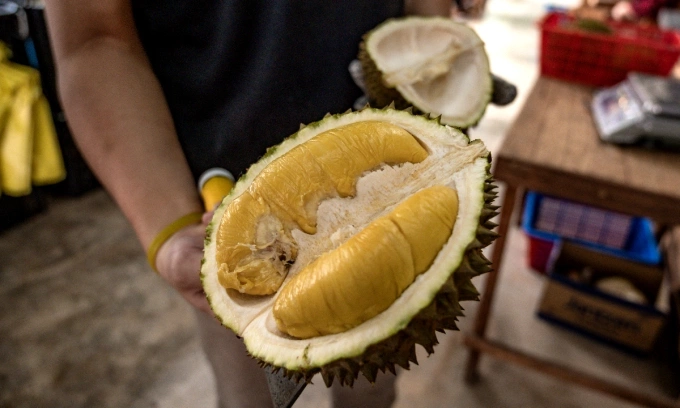“Indonesia produced almost 2 million tonnes of durian in 2024, according to data by Statistics Indonesia (BPS). This figure far exceeds Malaysia’s,” the minister, also referred to as Zulhas, told local media on Monday, as quoted by Malaysian news site World of Buzz.
He noted that last year’s production was the highest in 5 years, with Java, Sumatra, Kalimantan and Sulawesi being the top growers.
“With this fact, I reckon durian is Indonesia’s national fruit,” Zulhas said, further noting that the fruit is a culture and an important source of income for millions of farmers in the country.
Though he recognized that Malaysia’s exports of the stinky fruit have risen, fueled by premium varieties like Musang King, he stressed: “When talking about national symbols, you should stand on data and reality.
“Durian Nusantara is Indonesia’s strength in Asia. Indonesia has 21 out of 27 durian species recognized globally, and up until 2024, some 114 new superior varieties are registered.”
 |
|
A worker shows a Musang King variety of durian at a shop in Kuala Lumpur, Malaysia, on July 8, 2020. Photo by AFP |
His pointed remarks followed a proposal from Malaysia’s Durian Manufacturer Association, which suggests that local authorities crown the fruit as Malaysia’s national fruit and designate July 7 as National Durian Day.
Datuk Nor Sam Alwi, director-general of the Agriculture Department, said the department had received the proposal on Sep. 8 but no formal decision has been made on either suggestion.
Eric Chan, the association’s president, said the proposal was intended to celebrate Malaysia’s special ties with the fruit and bolster its global branding, not to claim ownership.
“Durian has long been an integral part of Malaysia’s cultural heritage, agricultural landscape and global identity,” he said, as quoted by The Star.
He acknowledged Indonesia’s larger output and long-standing ties to the fruit, but noted that a national symbol can also be selected for its “cultural significance, historical roots and global association.”
He pointed out that Malaysia boasts an international reputation for premium, high-quality durians. He also stressed that Malaysia respects Indonesia’s position regarding the fruit.
“Both Malaysia and Indonesia share deep cultural and historical ties with durian – it thrives across our region,” Chen said. “Making it Malaysia’s national fruit does not diminish Indonesia’s right to do the same.”
The stinky fruit has become an increasingly important part of Malaysia’s economy. The fruit is now shipped to over 40 markets, including China, South Korea, the U.K. and the UAE, with total exports climbing from RM570.8 million (US$137.5 million) in 2020 to RM1.51 billion in 2023 before dipping to RM1.18 billion last year.
The Ministry of Agriculture and Food Security projects that shipments could reach 69,000 tonnes worth RM1.8 billion by 2030, according to national news agency Bernama.





